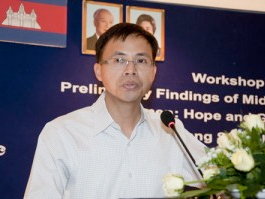Phnom Penh (March 27, 2013) – The Women, Hope and Growth project was aligned to the Cambodian Millennium Development Goals, National Strategic Development Plan, 5-year Strategic Plan Neary Rattanak III of Women’s Affairs Ministry and contributed to poverty alleviation and promoting gender equality in the country, according to the preliminary findings of amid-term evaluation on the implementation of the project presented at a half-day workshop today.

LWD Executive Director Dr. Sam Inn said that the preliminary findings which included good practices, challenges and recommendations were very important for LWD. The findings would be used for developing an action plan in order to further increase the effectiveness of the project implementation.
He said gender mainstreaming was one of LWD’s program key components, which specifically focused on the empowerment of women and enhancing gender equity.
Dr. Inn highlighted challenges Cambodian women faced and was strongly committed to address these challenges. “Limitation of women’s roles and rights by society, tradition and culture is a big challenge in hindering women’s self-development, participation in society and decision making. We want to change this practice,” he said.
“Women, Hope and Growth” is a 4-year project funded by Women’s Bank/Finn Church Aid (WB/FCA) and has been implemented by LWD since Jan 2011. The project cost 660,000 Euros. The objective of the project is to reduce women’s vulnerability by empowering them to protect their common interest and benefits.

Ms. Anu Riikonen, FCA Regional Representative for Asia, said up to date 24 Women’s Agricultural Cooperatives (AC) with over 3,000 members have been established under WB/FCA support. “Many cooperatives have made success in their business development, mainly selling rice, rice seeds and fertilizers. They also provide small loans for their members to develop further their agricultural products,” she said.
“In the future, we need to pay more attention to the training and capacity building needs of the cooperatives and assist them in developing their business further in a sustainable manner from micro level towards becoming small and medium enterprises with specialized products,” she said.
The evaluation, led by an external independent consultant, aimed to assess the relevancy and effectiveness of the project implementation during the first two years.
The Team found that the capacity of agricultural cooperative committees were still limited. The women in the Village Bank and AC do not feel completely confident to lead and manage their organization and communicate to local authority. Gender–based violence is still a serious issue for women in the community and some of the women still do not have enough courage to express their idea, concerns and needs.

The findings included some recommendations for LWD to take further actions. The Team recommended that the project should have a sustainability strategy with a clear approach on women empowerment both at LWD organizational and at the project levels. LWD should improve the learning and feedback systems of the project including documentations of the project and consider building on ownership of women in agricultural cooperatives, village banks in relation with Departments/Offices of Agriculture at the provincial and district levels and private sectors related to their works.
For more information, please, contact Leak Ratna (Mr.), LWD Communication Coordinator | E-mail:ratna@lwd.org.kh | Phone: 012 819 121
